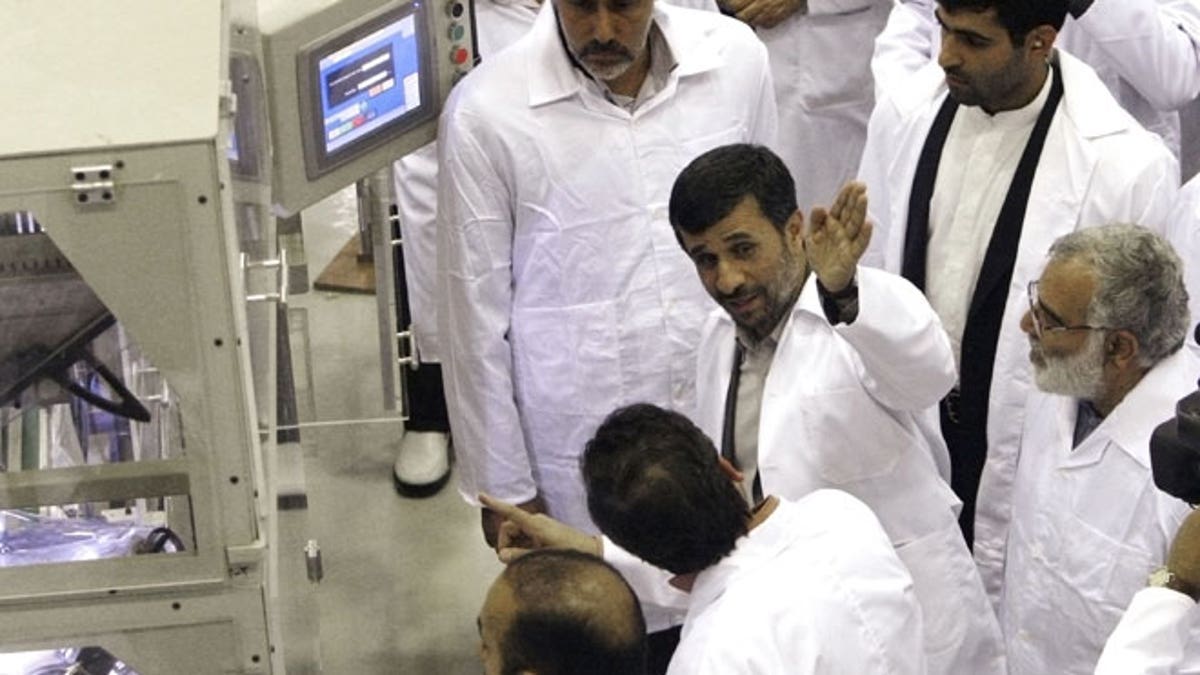
April 9, 2009: Iranian President Mahmoud Ahmadinejad, second right, gestures, as he visits Iran's Fuel Manufacturing Plant (FMP), a new facility producing uranium fuel for a planned heavy-water nuclear reactor, just outside the city of Isfahan, 255 miles south of Tehran, Iran. (AP)
JERUSALEM – The U.S. has plans in place to attack Iran if necessary to prevent it from developing nuclear weapons, Washington's envoy to Israel said, days ahead of a crucial round of nuclear talks with Tehran.
Dan Shapiro's message resonated Thursday far beyond the closed forum in which it was made: Iran should not test Washington's resolve to act on its promise to strike if diplomacy and sanctions fail to pressure Tehran to abandon its disputed nuclear program.
Shapiro told the Israel Bar Association the U.S. hopes it will not have to resort to military force.
"But that doesn't mean that option is not fully available. Not just available, but it's ready," he said. "The necessary planning has been done to ensure that it's ready."
Iran says its nuclear program is for peaceful purposes, like energy production. The U.S. and Israel suspect Iran is pursuing nuclear weapons, but differences have emerged in how to persuade Tehran to curb its program.
Washington says diplomacy and economic sanctions must be given a chance to run its course, and is taking the lead in the ongoing talks between six global powers and Iran.
Israel, while saying it would prefer a diplomatic solution, has expressed skepticism about these talks and says time is running out for military action to be effective.
President Barack Obama has assured Israel that the U.S. is prepared to take military action if necessary, and it is standard procedure for armies to draw up plans for a broad range of possible scenarios. But Shapiro's comments were the most explicit sign yet that preparations have been stepped up.
In his speech, Shapiro acknowledged the clock is ticking.
"We do believe there is time. Some time, not an unlimited amount of time," Shapiro said. "But at a certain point, we may have to make a judgment that the diplomacy will not work."
The U.S. envoy spoke on Tuesday. The Associated Press obtained a recording of his remarks on Thursday.
The five permanent members of the U.N. Security Council and Germany are gearing up to for a May 23 meeting with Iran in Baghdad. Shortly after the meeting, the U.N. atomic agency is to release its latest report card on Iran's nuclear efforts.
In Tehran on Thursday, top nuclear negotiator Saeed Jalili warned against Western pressure at next week's talks, which are a follow-up to negotiations in Istanbul last month that all sides praised as positive.
"Cooperation is what we can talk about in Baghdad," Jalili said in comments broadcast on Iranian state TV.
"Some say time is running out for the talks," he added. "I say time for the (West's) pressure strategy is running out."
Four rounds of U.N. sanctions have failed to persuade Iran to halt its uranium enrichment, a process that has civilian uses but is also key to bomb-making. But recent U.S. and European measures, including an oil embargo and financial and banking sanctions, have bludgeoned Iran's economy by curtailing its ability to carry on economic transactions with the international community.
Israel says a nuclear weapon in the hands of Iran would threaten the Jewish state's survival and has waged a fierce diplomatic campaign against the Iranian nuclear program for years. Israel cites Iranian calls for Israel's destruction, Iran's arsenal of missiles, and its support for anti-Israel militant groups.
Senior officials have expressed skepticism about the sanctions' effectiveness, and believe Tehran is using the talks to stall the international community as Iran moves ever closer to a nuclear bomb.
The United States has urged Israel to refrain from attacking, at least at this point. Tough new economic sanctions are to go into effect over the summer, and American officials fear an Israeli strike could set off a regional war without significantly setting back the Iranian program.
Prime Minister Benjamin Netanyahu argues the negotiations will fail unless Iran agrees to halt all uranium enrichment, ship its current stockpile of enriched uranium out of the country and dismantle an underground enrichment facility near the city of Qom.
Maj. Gen. Ido Nehushtan, who until a few days ago commanded Israel's air force, said in a Jerusalem Post interview Thursday that the air force is prepared for any scenario, including striking Iranian nuclear facilities.
Israel's military chief told the Associated Press last month that other countries as well as Israel have readied their armed forces for a potential strike against Iran's nuclear sites.
